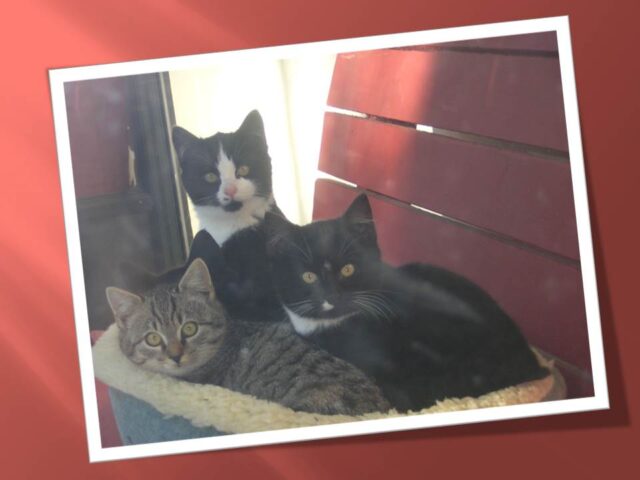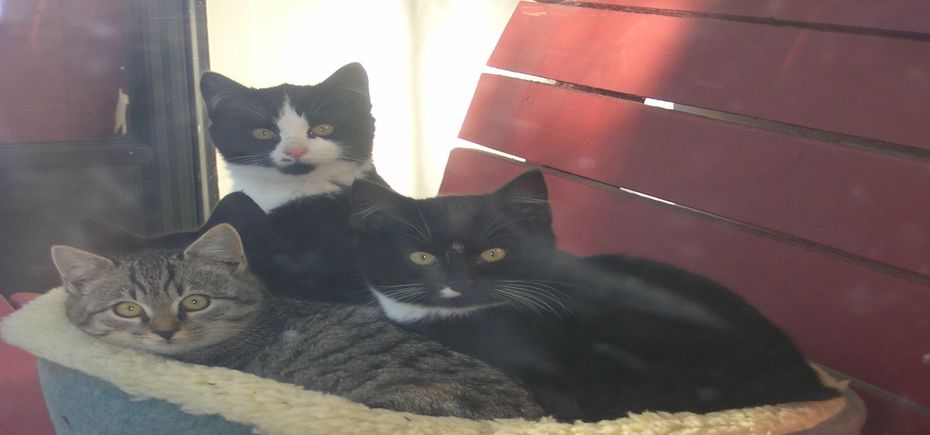Three little sisters appeared upon our front porch 17 years ago. Their momma, Yin, was attentive, loving and managed to keep them together and safe. Their papa, Scruffy, was a “cat-about-the- hood” yet stayed close by his family and was extremely protective.
Shortly after appearing in our lives their momma was struck and killed by a car at the end of our driveway. My own mother, Leah, also died by automobile. I had an immediate, visceral connection with these motherless kittens.
Since Scruffy was not the least bit interested in giving up his cat-abouting-the-hood-adventures and becoming an indoor cat, he granted us permission to take in his children to care for them. And care for them we did.
The three sisters, Izzie, Maisie and Tigger lived well-loved, peaceful, safe lives along with several other formerly feral cats we brought off the streets and into our home. Shadow, being one of them, our “rough necking, rumble with our dogs” cat. Shadow was challenged by health issues later in his life. Maisie, one of the sisters, stuck by his side. She was with him day and night throughout his treatments making sure he knew he was loved and in good company.
One June 21st Shadow, quite unexpectedly, died. We were bereft. As customary in our family, we laid him out in his bed in the middle of the living room to provide an opportunity for all of us to say goodbye. As we sat there, Maisie walked over, stepped into his bed and laid down with is body. She was devastated – it was evident. Her health rapidly declined. She died three days later. We believe she died of a broken heart.
We have made a point of watching our dogs and cats like hawks after one passes for signs of grief (three years ago we lost two of our dogs within four months of each other) so we kept a close watch on Maisie’s only living sister, Izzie (Tigger her other sister passed in 2022) but our other two remaining cats, Peanut and Thomas and two remaining dogs, Harris and Hazel. Izzie suddenly took ill and passed on July 15th.
We do believe sometimes love is stronger than life itself.
It takes us places we never knew possible.
Our family was suddenly reduced from five cats to two. There is a throbbing absence within our home.
But this is not about absence. It is about presence. It is about being fully present for those left behind.
It is about love.
It is about endurance.
It is about will.
It is about believing that everything in life happening for a reason.
Love does live on.
It lives on in every breath we take, in every memory we recall, in every sigh we sigh, and in every moment we live.
I am grateful love lives on.
Love sustains us.
Love buoys us when we are drowning in grief.
It gives us hope for better days.
Animals do love. They do grieve and they do remember.

VCA Animal Hospital provides the following signs of a grieving animal so you can keep a watchful eye over your loved ones:
Change in appetite. According to a study in New Zealand, about 30% of pets have decreased appetite after losing a companion. For many dogs and some cats, eating is a social experience and they do not eat well without companionship.
Change in vocalization. Cats and dogs may bark, meow, or howl more than usual. Watch for an increase in plaintive vocalizations – sad sounds that may be directed toward you or may occur in locations that the deceased pet favored. On the other hand, if your dog or cat is uncharacteristically quiet, that may also be a sign of emotional depression.
Change in habits. Grieving pets may sleep more than usual. In a New Zealand study, about 30% of grieving dogs and 20% of cats napped more. Other pets pace restlessly. Your pet may even hide or rest in unusual locations.
Change in social interactions. The New Zealand study found that about 60% of dogs and cats clung more to humans after the loss of a companion pet. They may experience distress when left home alone. Other pets become withdrawn and refrain from engaging in previously enjoyed social interactions with the remaining household people and pets.
Change in grooming or bathroom habits. If your normally fastidious pet soils the house or misses the litter box, this should raise a red flag. If your cat or dog doesn’t groom himself, take note. He could be grieving.
Seeking behavior. Approximately 60% of pets repeatedly look for lost companions in their normal napping spots. If your pet constantly returns to his deceased friend’s favorite sleeping or resting place, he may be experiencing grief.
For additional information visit https://vcahospitals.com/know-your-pet/helping-your-grieving-pet
©2024 ALL Rights Reserved. Listen To Thyself with Diane Marie Ford. Share this blog post to your heart’s content, but please do not use it without my written permission. Thank you.

